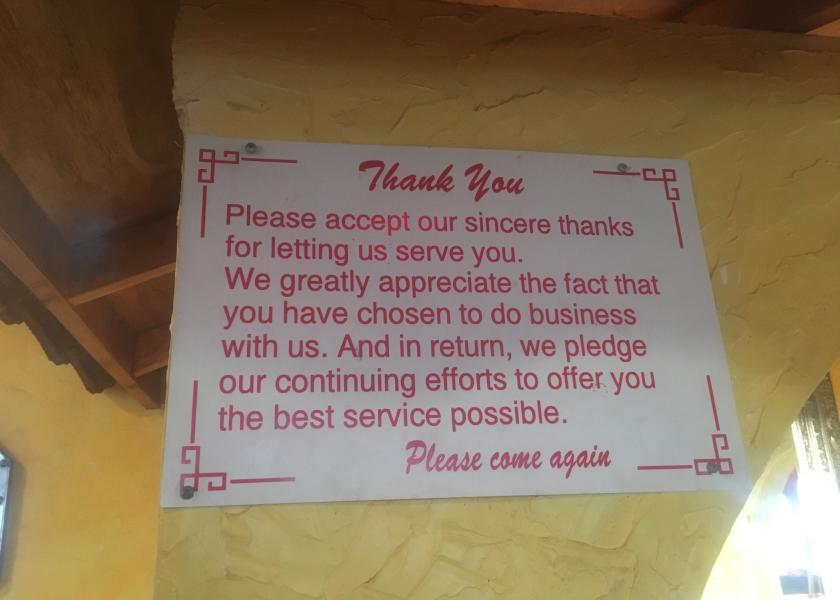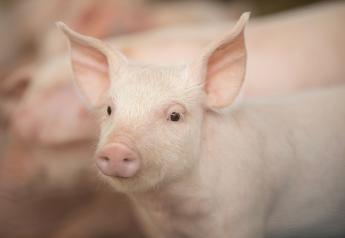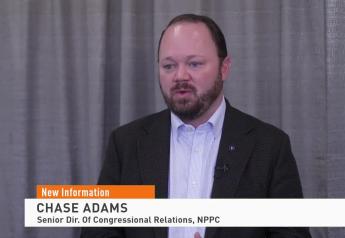Kate Miller: I Will Not Thank a Farmer

Note: The opinions expressed in this commentary are those of Kate Miller, and do not necessarily represent the views of Drovers or Farm Journal.
I was dining alone at my favorite local Mexican restaurant. I was covered in mud because it hasn’t stopped raining in Arkansas since October. I was freezing because the heater quit working in the tractor mysteriously, and I misplaced the bungee cord that closes the farm truck door. As I was scrolling through social media, I could identify with the numerous posts from ranchers I saw who begrudgingly were fighting the elements, be it blizzards and record setting temperatures or this never-ending monsoon and mud in the south. There were multiple posts about “thanking a farmer.” After spending months, tied to a tractor and sick calves and worrying about weather, I could identify with wholly that sentiment.
Having finished my beef fajitas, I noticed a sign the owner had placed at the register. It read: “Please accept our sincere thanks for letting us serve you. We greatly appreciate the fact you have chosen to do business with us. And in return, we pledge our continuing efforts to offer you the best service possible.”
It struck a nerve.
The owner of this establishment did not demand that I thank him for his efforts to produce this dinner. He thanked me for choosing to do business with him.
In my mind, I scrolled through the Twitter feed I had witnessed. For how long have we as the ag community demanded that our customers thank us? When was the last time we thanked them? Are we operating from a place of entitlement, where we believe that our professions are somehow sacrosanct in the scheme of the economic ecosystem?
But wait, we toil in the hot summer sun and the cold winter snow—every single day. Yes, but so do the oil derrick hands in Odessa, Texas. But we cannot skip a day because living beings rely on us. Yes, doctors face the same challenge. We work 24/7 and never get a day off—no one just gives me a salary! Yes, so do most entrepreneurs. Yes, but we are underpaid! Said everyone the whole world over.
Even within the industry, other segments of our own business do not take to the Twittersphere and demand praise and thanks. When was the last time you saw any one who worked in a plant demand to be thanked for the 12-hour shift on the debone line?
What is abjectly worse is that by our own admissions we feel that we farmers and ranchers are the most important members of the value chain—we criticize packers for their margins. We pay the vet bill, eventually. We mock consumers for their ignorance and again for the demands they make upon us. And then we turn around and have the audacity to ask everyone to thank us?
When was the last time we showed any appreciation to anyone who chose to do business with us? When was the last time we thanked a feeder or a packer or a distributor or a grocer?
By our own standards--if we are going to thank the farmer, we need to thank the pen rider who doctors sick cattle in heat and blizzards, right? We need to thank the veterinarian who amassed six-figure student loans to answer your call at 2 a.m. because you can’t get one pulled. We need to thank the immigrant who feeds his family by spending 6 days a week surrounded by death, cutting the jugular of 1,000 head a day. We need to thank the USDA inspector who earned a master’s degree to work in below freezing temperatures, who worries if another government shutdown will impede her salary.
We need to thank the line supervisor who can speak broken Spanish and Swahili and Burmese to make sure the job gets done right. What about thanking those same production line workers who do the same repetitive cut day after day after day? We need to thank the blast freezer fork lift operator who works alone at sub-zero every day of the year. We need to thank the truck driver who misses his son’s first t-ball game on a run to Amarillo. We need to thank the sales manager who takes the cussing from a chef and loses his bonus because of a rotten injection site lesion in a round because a rancher ignored Beef Quality Assurance (BQA). We need to thank the sales rep whose paycheck depends on the yield of brisket from week to week. We need to thank every single person who touches our product once it leaves our farms. We need to thank them for the work they do that makes our livelihood possible.
But mostly, we need to thank our customers. We need to thank the people who buy our product, who put their faith in the chain and decide to buy beef to serve their families. We need to thank a chef for serving beef in their restaurants. Instead of asking them to thank us for arguably doing our job, we need to thank them for giving the product we raise value. Without the customer putting beef in their shopping cart or without someone choosing as steak on a restaurant menu, we would cease to exist.
But the reality is as well without the pen rider, the vet, the packer, the line worker, the truck driver, the salesman, the marketer, the grocer---we would cease to exist as well. Cattlemen are a link in the chain, and some of us can argue that we are the endangered species in the ecosystem. (But anyone trying to hire an experienced meat cutter or a driver might argue differently.) The best way to preserve our way of life, the best way to ensure that cattle remain in our pastures is to make sure that beef remains on tables of consumers.
Everything else is noise. Everything else is shouting into the void. We can disagree on Checkoffs. We can disagree on Country of Origin Labeling. We can disagree on BQA. But at the end of the day—without the consumer—none of that matters.
I urge those of you who use social media to interface with the world at large to stop demanding that consumers heap thanks upon you. Instead take a moment to listen to their questions, to answer them without condescension or reproach, and then thank them for the opportunity to tell your story. Then thank them for their patronage, ask them how you can help them have a better beef experience and be a representative of your commodity. Check your entitlement. Start a dialogue. You never know, you might find that by extending grace to the community that supports you---you’ll find the appreciation that you seek.
Bio: Kate Miller is the managing partner for IMB Cattle Company, a third-generation ranch in Southern Arkansas which just celebrated its 51st anniversary. With over ten years in protein marketing including domestic and export sales, Kate continues to try and bridge the ever-widening gap between production agriculturalist, the food production industry and consumers.







